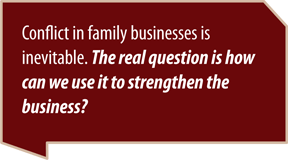It’s been estimated that 75% of small businesses are family businesses. Just think of how many local businesses you deal with routinely: the roofer you just contracted with, the farm center you’re planning to buy your Christmas tree from, the carpet store you just used to fix up your family room … they’re all family businesses. Many of these businesses are multi-generational, and research has shown that a large majority of these businesses fail in the third generation. Research also indicates that those that last into the 4th and 5th generations have done so very intentionally, with a particular eye to managing the conflicts that can erode the business, and here we’re talking about internal conflicts, between the leadership in the family business.
Conflict in family businesses is inevitable. The real question is how can we use it to strengthen the business? So much depends on the relationships between the principals in the family business. Is there honesty, openness, willingness to be accountable, to share power and authority, to admit limitations without shame or fear of reprisals?
Stress can be a positive
 Conflict is a form of stress. What is harmful is not stress in and of itself, but chronic and unresolved high levels of stress. Some level of stress is necessary for good physical functioning. Ever stay in bed for a few days recovering from surgery, a bad bout of the flu, or a slipped disc? Remember how weak your legs were when you got up and tried to walk? That’s due in large part to a lack of reasonable stress on your leg muscles for the last few days. I will never forget when my Golden Retriever suffered a broken leg after being hit by a car. The surgeon told me the plate used to stabilize the fracture would have to be removed after 8 weeks, or the bone would be “stress protected” too much and would weaken, setting the stage for future fractures at the injury site. What might we take away from this analogy? That conflict, a particular form of stress, is necessary for growth and continuing development.
Conflict is a form of stress. What is harmful is not stress in and of itself, but chronic and unresolved high levels of stress. Some level of stress is necessary for good physical functioning. Ever stay in bed for a few days recovering from surgery, a bad bout of the flu, or a slipped disc? Remember how weak your legs were when you got up and tried to walk? That’s due in large part to a lack of reasonable stress on your leg muscles for the last few days. I will never forget when my Golden Retriever suffered a broken leg after being hit by a car. The surgeon told me the plate used to stabilize the fracture would have to be removed after 8 weeks, or the bone would be “stress protected” too much and would weaken, setting the stage for future fractures at the injury site. What might we take away from this analogy? That conflict, a particular form of stress, is necessary for growth and continuing development.
We need to develop two important attitudes:
- conflict is good and necessary
- avoidance of conflict guarantees more of the same, and worse
What are some primary causes of conflict in family businesses? Here are just a few:
- fear of conflict
- issues with lack of trust
- fears of vulnerability
- fears of admitting limitations, weaknesses
- unbalanced loyalties
- feeling “trapped” in the family business
- unrecognized / unaddressed mental health issues among principals
- reluctance to express praise and appreciation
- triangulation instead of directness in communication
- personalizing & reacting instead of listening & accepting
What do we need to develop in order to handle conflict more constructively? There are a certain number of factors the principals need to be actively mindful of in order for the family business relationships to flourish:
- learning to trust each other in an ongoing and durable manner
- developing a culture of fairness and appreciation of each member’s opinions
- learning to complement each other’s strengths and limitations
- developing accountability to each other
- learning how to disagree while maintaining respect for each other
- creating atmosphere of safety to engage in conflict in order to resolve issues
What steps can we take?
 If conflict isn’t managed creatively, what happens? Certainly, the problems get worse. People in leadership get polarized against each other. Inefficiency, dramas and hostility, heightened tensions that distract from the company’s basic goals all simmer below the surface and become part of the daily routine.
If conflict isn’t managed creatively, what happens? Certainly, the problems get worse. People in leadership get polarized against each other. Inefficiency, dramas and hostility, heightened tensions that distract from the company’s basic goals all simmer below the surface and become part of the daily routine.
The one great task the principals have to learn is to talk with each other honestly, authentically, and without fear of reprisals. One way to help your business move in this direction is to hire a conflict management consultant. A consultant can help you understand the nature of the conflicts upsetting your business, where they came from, and how to deal with them. For instance, are the conflicts about succession issues, loyalty clashes, compensation disputes? Clearly identifying what is at the root of a conflict is key to resolving it. The consultant can also help you create family leadership meetings to establish a structure that allows for safe and respectful conflict management. The meetings should be all about the “family process”, focusing on how we are relating to each other. These meetings should be held twice a month for 1 to 2 hours each session. During these meetings the consultant can help the principals to take turns responding to some key questions. Each member can ask “how am I doing as a leader?” “What could I be doing better?” “What do you see as my strengths?” “In what areas do you think I need improvement?” Asking for feedback , receiving the input, considering it nondefensively…this fosters a “platform of parity” among the principals. Not talking about products, about margins and sales, but conversations about relationships within the leadership group. The ultimate question might be “What would I do, what might I say, if I were not afraid?”
[author] [author_image timthumb=’on’]https://sensenigcapital.com/wp-content/uploads/2013/11/chase-thumb.jpg[/author_image] [author_info]Chase Kneeland is a PA licensed marriage & family therapist. He received his BS from Ursinus College and MDiv from Gordon-Conwell Theological Seminary. Nationally certified by the American Association for Marriage and Family Therapy in 1980, Mr. Kneeland directed a Pastoral Counseling Center prior to establishing a private practice in 1984, taught Behavioral Science in a Family Practice Residency Program, and consults in Family Business Conflict Management. He has recently retired from the Board of Supervisors of Worcester Township Pennsylvania after serving two terms. For more information on Chase please click here.[/author_info] [/author]


